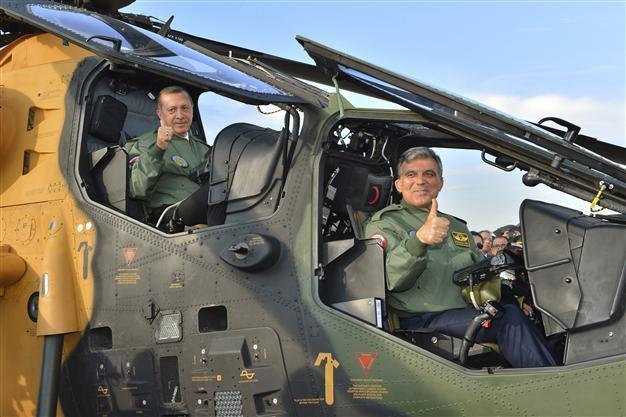Gül, Erdoğan to sit down soon for final consultation on AKP's candidate for presidency
ANKARA

Turkey’s President Abdullah Gül (R) and Prime Minister Recep Tayyip Erdoğan pose in the cockpit of an assault helicopter during a delivery ceremony of helicopters to the Turkish Armed Forces, in Ankara.
Turkey’s top two political veterans will shortly sit down for a final consultation concerning the ruling Justice and Development Party’s (AKP) candidate for the country’s first ever directly elected president in August.“We will hold a consultation with our honorable president one more time,” Prime Minister Recep Tayyip Erdoğan told reporters on June 25, when asked whether he would hold a meeting with President Abdullah Gül before July 1. On that particular date, the AKP is set to make its long-awaited announcement regarding its candidate, putting an end to speculation about Erdoğan’s potential run for the post. It was Erdoğan himself who said on June 24 that his party would announce its candidate on July 1, two days before the official deadline.
Later on June 25, Erdoğan was set to pay visits to the leaders of the Great Union Party (BBP), the Democratic Left Party (DSP) and the Felicity (Saadet) Party, which are not represented at Parliament, as part of his final consultations regarding the presidential elections.
In order to agree on a decision that will determine the future direction of the country, Erdoğan and Gül may meet either before or after a bimonthly meeting of the National Security Council (MGK) scheduled to gather today (June 26), which will be chaired by the latter, according to news reports. The two may then hold their final consultations in Istanbul over the weekend.
During the MGK meeting, the two are likely to make a decision on the name who will serve as the “caretaker prime minister” and head of government for the 10 months between the presidential elections and the June 2015 parliamentary elections, in the event of Erdoğan’s candidacy and victory in Turkey’s first ever direct presidential elections.
In an apparent bid to contain a potential internal turmoil that may weaken his ruling AKP in the run up to presidential elections in August, which will be followed by parliamentary elections within 10 months, Erdoğan has meanwhile ruled out any “dramatic approach” to nomination of their presidential candidate.
“Gazi Mustafa Kemal, Adnan Menderes, Turgut Özal, they came, they put up a fight and they passed away. What has prevailed has been the cause, the Republic of Turkey, and our nation. Many more names will come and pass away. God willing, both this nation and this country will continue existing and this glorious flag will continue waving. Again, I want to remind that we are not sending one of us to death, we are only sending him to the presidential office,” Erdoğan said on June 25 at an expanded meeting of his party’s provincial chairs.
PM too busy to meet with opposition’s joint candidate
The ruling AKP is among the political parties from whom Ekmeleddin İhsanoğlu, the joint presidential candidate of the two major opposition parties, has so far asked for an appointment.
İhsanoğlu, the former secretary general of the Organization of the Islamic Cooperation (OIC), who at the time worked closely with the Erdoğan government, conveyed his request to the Prime Ministry Office over the telephone on June 24, anonymous sources from Erdoğan’s office told Anadolu Agency on June 25, adding that Erdoğan’s daily schedule on June 25 meant he was “not available” for such a meeting. It was not clear whether İhsanoğlu had requested an appointment on another day for the meeting, or whether the Prime Ministry had offered an alternative day.
In addition to the main opposition Republican People’s Party (CHP) and the Nationalist Movement Party (MHP), which have jointly nominated him for the presidential role, İhsanoğlu will also pay visits to the BBP, the Peoples’ Democracy Party (HDP) and the Democratic Party (DP) on June 26. The DP, which used to be Turkey’s party of government, is also not represented at Parliament.
















